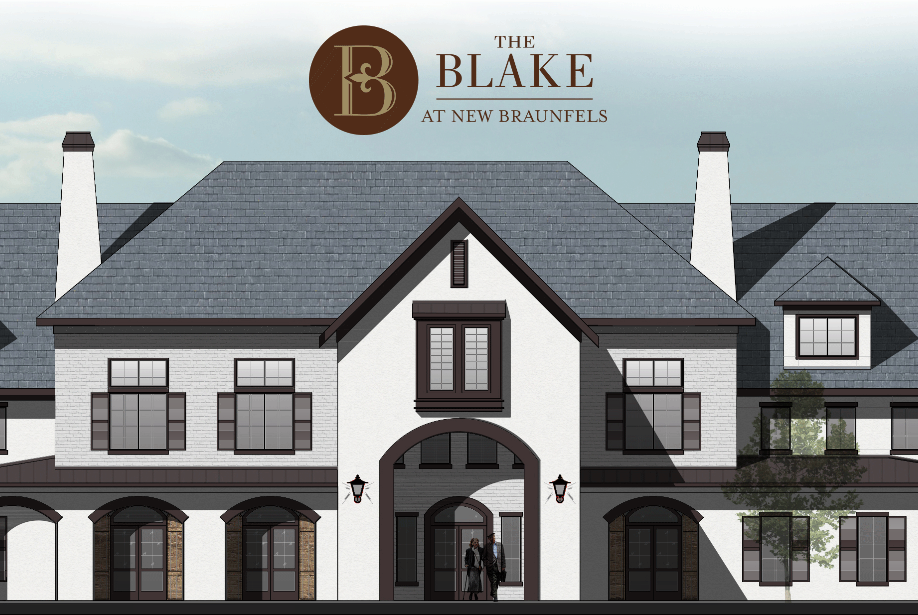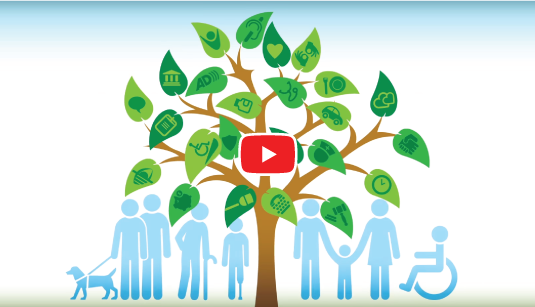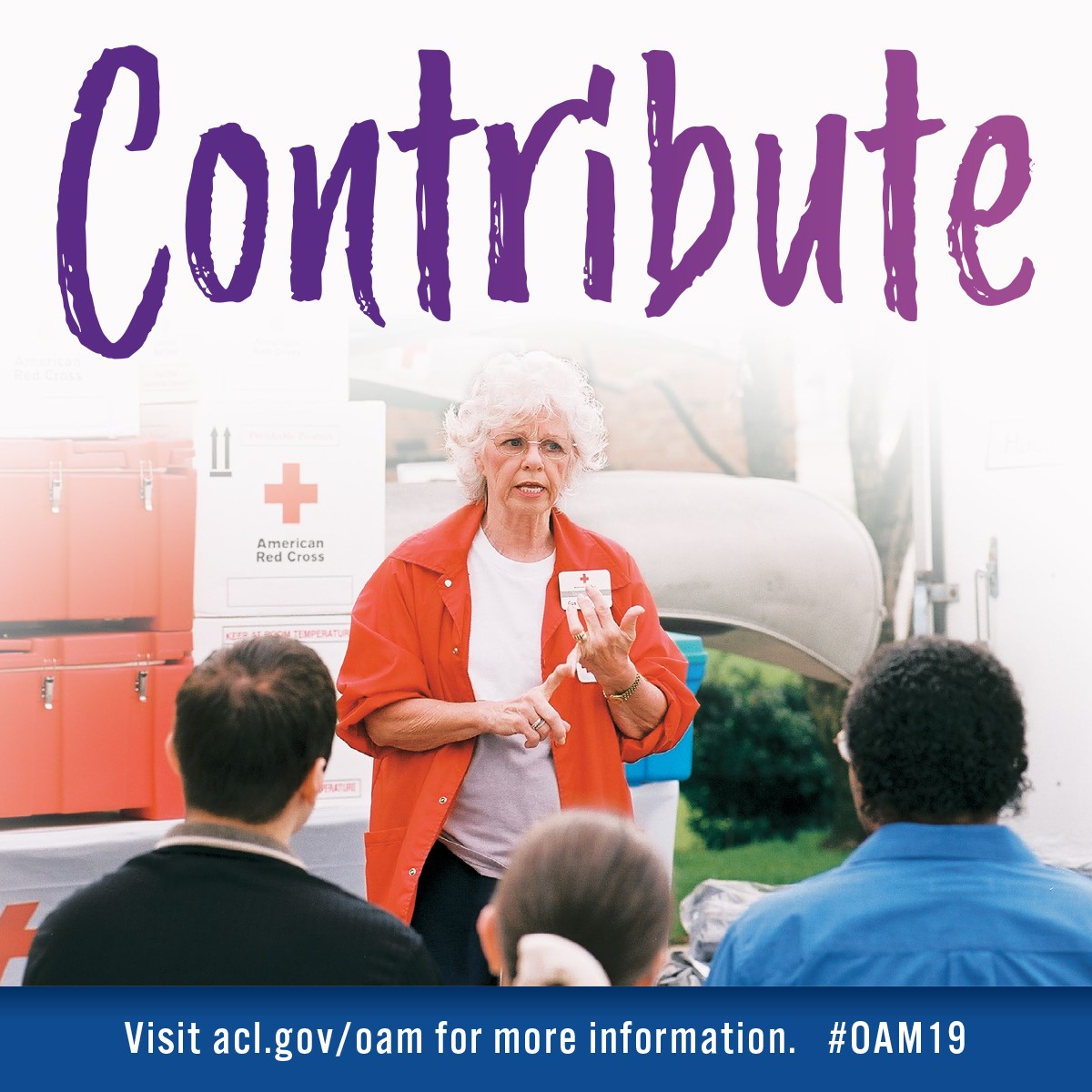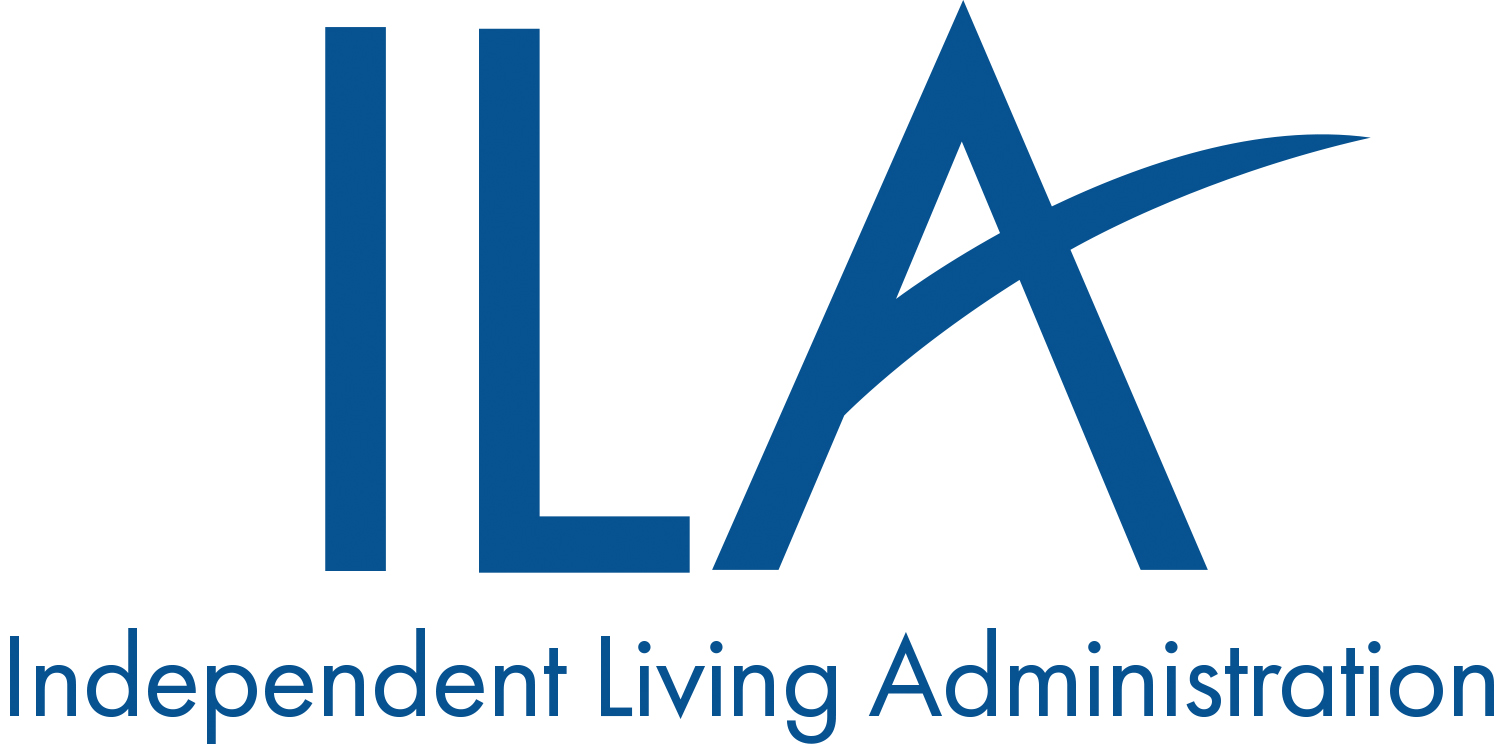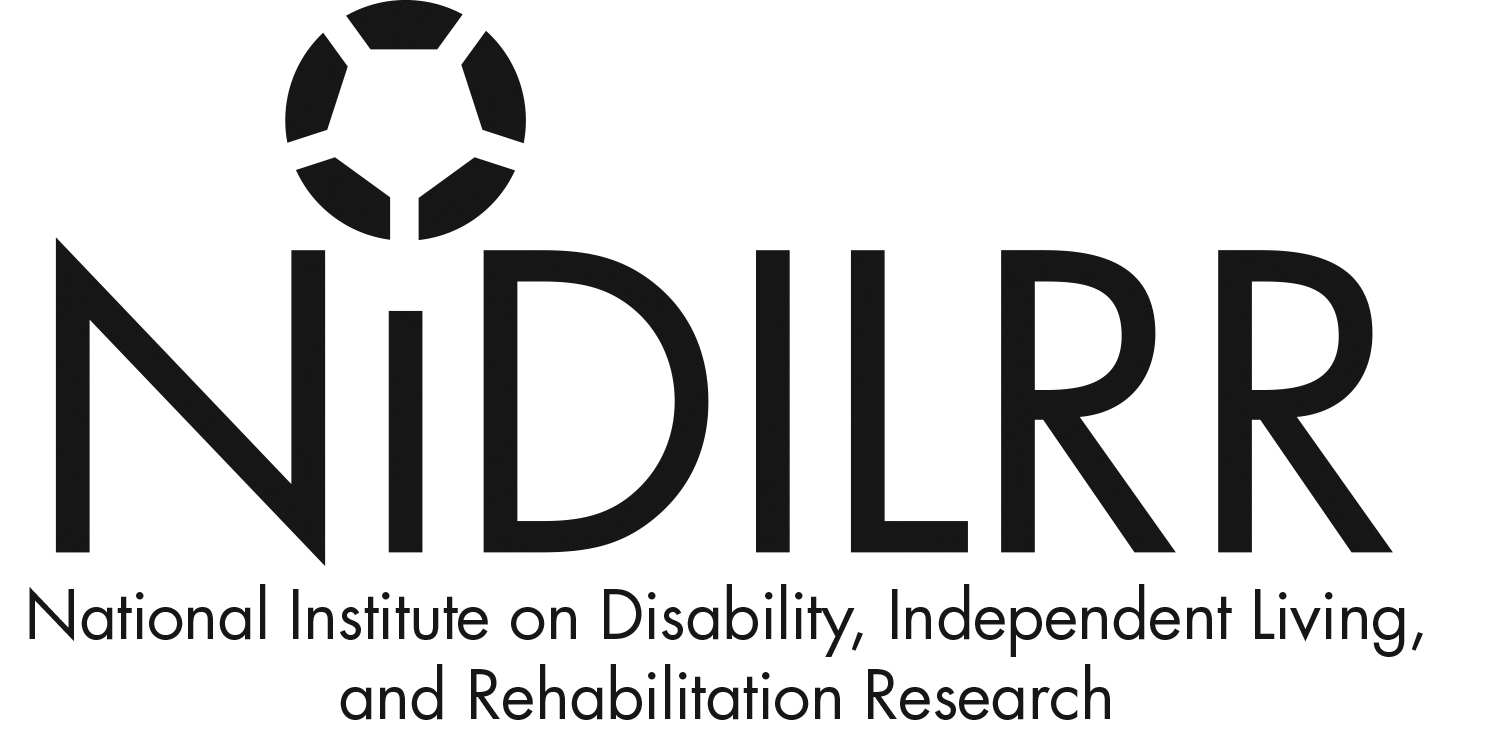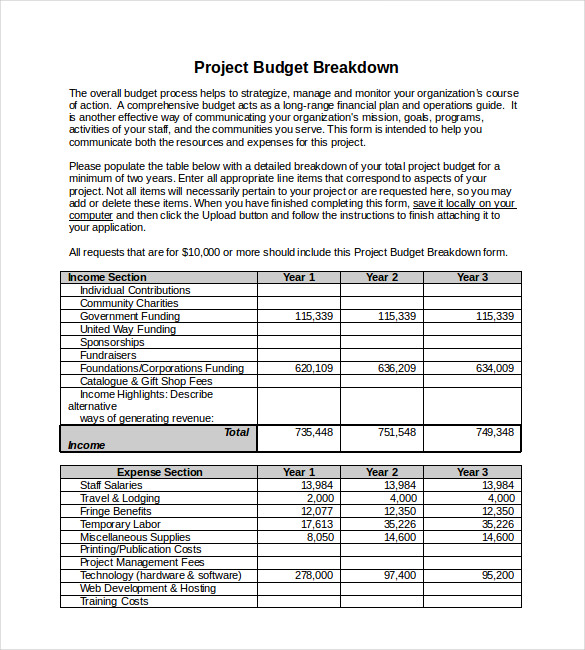The OAA authorizes a range of services and supports that help older Americans remain as independent and productive as possible in their own homes and communities. Titles I and II declare the Act's objectives and establish the AoA, the federal coordinating agency for OAA services. Title III – Grants for State and Community Programs on Aging – covers supportive services such as case management, senior center services, in-home services, transportation, and information and referral. Also included under Title III are nutrition programs, such as meals-on-wheels and senior center group meals; family caregiver support; and health promotion and disease prevention services. Funds for Title III programs are distributed based on a state's proportionate share of either the age 60 or older population or, in the case of caregiver support programs, the age 70 or older population. Each state then has its own formula for allocating OAA funding to area agencies on aging which enables the delivery of services to local areas.
The intent of the OAA is to promote the dignity of older adults by providing services and supports that enable them to remain independent and engaged citizens within their communities. The original OAA established the Administration on Aging and the aging services network that provides essential home and community-based supportive services. AoA is now part of the Administration for Community Living within the Department of Health and Human Services . OAA funding is distributed to 56 state agencies, over 200 tribal organizations, two native Hawaiian organizations, more than 600 area agencies on aging and 20,000 local service providers. While the program is open to older individuals, generally defined as 60 and older, it focuses on offering assistance to persons with the greatest social or economic need, such as low-income or minority persons, older individuals with limited English proficiency, and older persons residing in rural areas. Most services do not require means testing or copayments, but donations may be requested and some newer programs may have cost sharing on a sliding scale.
Unfortunately, years of limited funding have restricted access to OAA services, resulting in waiting lists for many of these essential programs. They also support families by offering services to caregivers, and they provide jobs in the health and long-term care sectors in local communities around the country. The Independent Living movement first gained prominence in the 1970's with the passage of the Rehabilitation Act of 1973.
"The Act" established federal rules and funding requirements for the development and operation of Independent Living services programs by Centers for Independent Living located throughout the United States. ACL administers an array of Older Americans Act-funded programs, such as its chronic disease self-management education programs, through grant making to the aging network. The Positive Self-Management Program, developed at Stanford University, is offered to older adults with HIV in Maine through one ACL grantee, and there are other health and wellness programs that grantees have tailored and packaged for older adults living with HIV. Additionally, ACL's Office of Healthcare Information and Counseling manages the State Health Insurance Assistance Program . SHIP counsels Medicare-eligible individuals to assist them with making informed health insurance decisions, which is helpful to those who are receiving Ryan White HIV/AIDS Program services.
Lastly, ACL's resource centers support grantees' work with targeted populations to provide services to historically underserved minority communities. In particular, the SAGE National Resource Center on LGBT Aging provides HIV and aging resources to ACL's grantees and the communities they serve. Whether it be home modification, transportation to medical appointments, or caregiver and home delivery meal services, all of ACL's programs "can be of benefit to people over 60 with HIV," as noted by Andrea. In carrying out a development activity under a Field Initiated Projects development grant, a grantee must use knowledge and understanding gained from research to create materials, devices, systems, methods, measures, techniques. Tools, prototypes, processes, or intervention protocols that are beneficial to the target population.
Please note that this will be the funding opportunity for Field Initiated Projects development proposals. We will invite Field Initiated Projects research proposals under a separate announcement. NIDILRR's FY 2022 Field Initiated Projects will include a combination of research applications and development applications, depending on the combined ranking of individual research and development applications by the peer review panel. To build the evidence base, ACL funded cooperative agreements for the development and testing of model approaches towards coordinated and comprehensive systems for enhancing and assuring the independence, integration, safety, health, and well-being of individuals with intellectual and developmental disabilities living in the community.
In FY18, ACL implemented an evaluation of these model programs to determine whether the models implemented across the sites impact the quality of life of individuals with developmental disabilities as follows. Information from the evaluation will be used to inform future ACL funding announcements and the training and technical assistance provided by ACL to communities serving individuals with intellectual and developmental disabilities to ensure the integration of evidence into ACL's programming. While the evaluation is not yet complete, initial findings about what works were integrated into the requirements of the funding announcement for the FY18 award cycle. The ACL Business Acumen Learning Collaborative2 is a community-level effort to improve the business acumen of the organizations and agencies that provide community-based services.
Greenlee noted the tremendous support that The John A. Hartford Foundation and The SCAN Foundation have given as ACL has worked to change the network of services it supports and to make previously free services more sustainable in an uncertain funding climate. "We are taking a national network of nonprofits—the area agencies on aging centers for independent living—and changing their fundamental business structure," Greenlee said. "Not their mission, not their value, not their contribution, their structure." These are primarily grant-based organizations that receive money from the federal government via the states and the Older Americans Act, she explained. They are learning to become providers, to demonstrate their economic value, and to bill for their services.
Possible opportunities include establishing meal providers that hospitals can contract with to deliver meals to the home of someone recently released from the hospital. Other services that might be able to generate fees rather than subsist on grants include community-based transportation networks and case management. There is still a role for services that are provided free of charge, Greenlee said.
The challenge is that there is an assumption that all of the free community services are plentiful and will continue to be available for the clients of large long-term care providers, managed-care organizations, and hospital systems, even in an uncertain funding climate. As the Obama Administration comes to a close, Greenlee and her colleagues at HHS have been working on a proposed budget for 2017. One question the Office of Management and Budget has asked was why the Centers for Medicare & Medicaid Services is not doing this work. The purpose of NIDILRR's ARRT program is to provide advanced research training and experience to individuals with doctorates, or similar advanced degrees, who have clinical or other relevant experience. ARRT projects train rehabilitation researchers, including researchers with disabilities, with particular attention to research areas that support the implementation and objectives of the Rehabilitation Act and improve the effectiveness of services authorized under the Rehabilitation Act. ARRT projects must provide advanced research training to eligible individuals to enhance their capacity to conduct high-quality multidisciplinary disability and rehabilitation research to improve outcomes for individuals with disabilities.
This particular funding opportunity announcement invites applications for ARRT grants in NIDILRR's community living and participation domain. ACL has implemented a quality review system for developmental disability programs under ACL/AIDD. The QRS uses a three-tiered model to review program compliance, outcomes (i.e., evidence), and fiscal operations and use review results to target and coordinate technical assistance. Tier three is customized monitoring for programs that ACL has significant concerns regarding terms of compliance and performance.
ACL continues development of a formula grant monitoring framework for Older Americans Act Title III and VII state formula grants. The framework combines assessments of a grantee's progress toward program goals and objectives with identification of risk or instances of fraud, waste, and abuse.These reviews allow ACL, if warranted, to restrict grant funding based on findings of insufficient evidence of performance. Successful applicants are required to demonstrate expertise and experience in improving quality outcomes for individuals with developmental disabilities. ACL'sperformance strategypresents a high-level approach to the planning, conduct, and implementation of performance management. The strategypresents a high-level approach to the planning, conduct, and implementation of performance management and represents ACL's commitment to providing rigorous, relevant, and transparent performance data highlighting all the programs and initiatives ACL supports.
During the course of ACL's work on improving business acumen and the coordination of LTSS, four key issues have emerged that should be kept in mind as this work moves forward, Greenlee said. "If we monetize , people will have to know that they are buying something that has an outcome that they want," she said. However, she said, focusing on quality outcomes is hard for the aging services network because of its historic emphasis on outputs, not outcomes. For example, when ACL instituted a requirement that states and area agencies could only spend Older Americans Act funds on evidence-based programs, there was some resistance.
This requirement was a signal that an exercise program at a senior center could not be created just because someone volunteered to run it. The exercise program must have fidelity and be replicated with outcomes that are proven, Greenlee explained. Toward this end, HHS has asked the National Quality Forum to identify the domains needed for quality measures of LTSS.
The next step, Greenlee said, is to invest in research to populate these domains with data. Although some data are available at the local level, the research for home- and community-based services needs to be taken to a much larger scale. " OPE staff make specific recommendations to program staff to improve language around performance measurement and evaluation. The degree to which applications provide detailed information about their expected outcomes and how they will measure those outcomes informs funding decisions. The Americans with Disabilities Act of 1990 (42 U.S.C. § 12101) is a civil rights law that prohibits discrimination based on disability.
It affords similar protections against discrimination to Americans with disabilities as the Civil Rights Act of 1964, which made discrimination based on race, religion, sex, national origin, and other characteristics illegal. In addition, unlike the Civil Rights Act, the ADA also requires covered employers to provide reasonable accommodations to employees with disabilities and imposes accessibility requirements on public accommodations. Older American Act Title III and VII grantees use as system called NAPIS/CARDS for annual performance reporting. In FY 2018 ACL piloted a new web-based reporting system to improve the user experience and include additional data security and verification tools. These performance data, as well as data for the OAA Title VI program and data from a national survey which are used for performance reporting, are available in the Aging Integrated Database. NIDILRR has developed a data and performance management programto measure progress and track outcomes of competitive grant recipients.
The program has posted and made available annual performance data from grantees to all NIDIILRR staff from 2007 to 2013. ACL has implemented a quality review system for developmental disability programs under ACL's/AIDD. The QRS uses a three-tiered model to review program compliance, outcomes, and fiscal operations and use review results to target and coordinate technical assistance. The second tier is standardized, in-depth review involving a team of reviewers conducted on a periodic basis. Tier three is customized monitoring for programs for which ACL has significant concerns in terms of compliance and performance.
Under an overarching analytic support contract, ACL's program offices are able to transfer funds to OPE, which allows OPE staff to provide oversight and guidance regarding evaluation design and implementation, performance measurement development, and the interpretation of data for decision-making. This approach promotes coordination and allows close partnerships between programmatic experts and the evaluation experts in OPE to help programmatic staff develop needed evidence to support policy and funding decisions. She said that to do this work effectively, it is necessary to be able to live with dissonance. Disability and aging, for example, both have a history of stigma and discrimination, but they are not the same history, and civil rights factors into the field of disability in a way that it does not in aging. Therefore, bridging the fields of aging and disability requires patience, good intentions, and a lot of discussion about fundamental issues and clear communication about meaning. "The goal is not to think the same way or to be the same at all, but to have and articulate the same objectives," Greenlee said.
ACL has a shared vision of what it means to be an autonomous person living in the community with a need for both prevention services and supports. Greenlee cautioned that it is possible to get lost in the complexities of distinguishing between the different fields but to remain respectful and comfortable living with the differences. She said that ACL has changed some of the language it uses to accommodate the differences in how the aging and disability communities think and talk about "choice," living in community "for a lifetime," and end-of-life care.
She said that disability and aging work will not be the same, but there are opportunities because they share common threats and common goals, such as the threat of the medical community dictating how individuals should live their lives and the goal of individuals living their lives how they want them to be. ACL was initially established on April 18, 2012 by bringing together the Administration on Aging, the Office on Disability and the Administration on Developmental Disabilities. Through budget legislation in subsequent years, Congress moved several programs that serve older adults and people with disabilities from other agencies to ACL, including the State Health Insurance Assistance Program, the Paralysis Resource Center, and the Limb Loss Resource Center. The 2014 Workforce Innovation and Opportunities Act moved the National Institute on Disability, Independent Living, and Rehabilitation Research and the independent living and assistive technology programs from the Department of Education to ACL.
MIPPA funds are awarded to State grantees and to theNational Center for Benefits Outreach and Enrollment. The plans also require that States reflect successes achieved to date and direct their efforts to enhance and expand their MIPPA outreach activities. The National Center applicants must describe the rationale for using the particular intervention, including factors such as evidence of intervention effectiveness. To the extent that grantees had completed similar work in the past, they are asked to demonstrate in their funding applications that those efforts were successful. The data are reviewed and, as needed, technical assistance is provided to grantees. While ACL has not completed a formal agency-wide learning agenda, ACL has a processfor developing Center-specific learning agendas that will form the basis for an eventual agency-wide learning agenda to be completed and released in FY19.
The process involves annual reviews witheach ACL Center to support the generation and use of evaluation findings to inform agency strategies and decision making. Greenlee began the discussion by offering a possible explanation for the concerns Alkema presented that highlighted the disconnect between what Americans believe and the realities of aging and disability. Greenlee suggested that the disconnect results from individuals' feelings about the concept of independence. If admitting that they need care means that they will lose their independence, then they will not admit that they need care. However, if the question of independence and needing care is reframed by asking people what services they require to remain independent, then they make every effort to maintain their independence. She noted that the World Health Organization released a report that frames health as an issue of functional ability because of the way functional ability is linked to independence.
Similarly, hypertension itself does not affect independence, but having a stroke that results in paralysis will affect functional ability and independence. The third key issue relates to technology and, in particular, the development of interoperable electronic health record systems. Greenlee pointed to research on care transitions, funded by the Center for Medicare and Medicaid Innovation, as evidence that the lack of access that community-based organizations have to EHRs is a fundamental barrier to these organizations successfully moving forward. In some cases local organizations, such as the Area Agency on Aging in San Diego County—an aging and disability resource center—have gone so far as to build their own systems to interface with regional hospitals. It's not part of what the Office of the National Coordinator does," said Greenlee. "Technology will keep the aging network and disability programs and local communities .
At the starting gate if we don't talk about it, because no one is investing in ," said Greenlee. The Passport Program, funded by the Ministry of Children, Community and Social Services , helps adults with a developmental disability be involved in their communities and live as independently as possible by providing funding for community participation services and supports, activities of daily living and person-directed planning. The program also provides funding for caregiver respite services and supports for primary caregivers of an adult with a developmental disability. In our view, the most alarming part of the President's FY 2020 budget is the proposed change to Medicaid which would limit federal funding to states through per capita caps and block grants.
The President's FY 2020 budget proposes to reduce federal Medicaid spending by almost $1.5 trillion, and the block grant/per-capita cap change would begin in 2021. Such changes would negatively impact all low-income citizens living with chronic disease and would be particularly devastating to individuals with Alzheimer's disease and related dementias (AD/ADRD) and their family caregivers. According to the Kaiser Commission on Medicaid and the Uninsured, about one in four adults living with AD/ADRD in the community rely on Medicaid coverage over the course of a year. While not one of ACL's largest non-competitive grant programs, theHealth Promotion program(part of ACL's Preventative Health Services funded at $1.8 million) requires that funds be spent on evidence-based programs. This change followed a decade of progress by the aging services network to move efforts toward implementing disease prevention and health promotion programs that are based on scientific evidence and demonstrated to improve the health of older adults.
The federal FY12 Congressional appropriations law included, for the first time, an evidence-based requirement. The other significant stride forward that ACL has made, with strong support from CMS and the U.S. Department of Veterans Affairs, is a state-level effort to help improve the coordination of LTSS. ACL has taken the core principles of what CMS has done with its "no wrong door" approach for beneficiaries to gain access to CMS services and is working to extend a similar model to the entire range of aging and disability services. One goal of this work, Greenlee said, is to bring all potential beneficiaries to the table—not just those who have spent down all of their savings, but also those who still have savings and who, with some assistance, might be able to avoid spending down their savings and having to enroll in Medicaid to pay for their LTSS needs. She cited the collaboration between the Partners in Care Foundation and Blue Shield of California as one example of how states are designing programs so that they can provide a modest amount of help to individuals earlier, which may delay or prevent individuals from ever needing to enter the Medicaid system.
Kathy Greenlee of ACL and HHS began her presentation by recounting how when she first began working as the Assistant Secretary for Aging in 2009, HHS was putting together working groups to prepare for what would eventually become known as the Patient Protection and Affordable Care Act1 . She recalled how she and Henry Claypool, who was then Secretary Kathleen Sebelius's advisor on disability policy, would receive the lists of those who were to be members of the working groups, and neither one of them would be included. "That was troubling to us and also an early warning that health reform was not long-term care reform," Greenlee said. Although long-term care reform is occurring, she added, it was not organized that way, nor was there recognition of the connection to community-based work on aging and disability. It was for this reason that Greenlee, Claypool, and Sharon Lewis—then the Administrator of the Administration on Intellectual and Developmental Disabilities—worked to create ACL.
They envisioned ACL as the agency at HHS where the voices of older adults and people with disabilities would be heard in the health reform conversations. To provide a framework for the workshop's discussions, two keynote speakers talked about what maximizing independence and community living mean, the successes that have already been achieved, the challenges that lie ahead, and suggestions for how to meet those challenges. Kathy Greenlee, the Administrator of the Administration for Community Living and the Assistant Secretary for Aging in the U.S. Department of Health and Human Services , gave a keynote presentation on the history and current state of the federal government's efforts to support community living and independence. Gretchen Alkema, the Vice President for Policy and Communications at The SCAN Foundation, then discussed the contrast between how Americans perceive issues of aging, disability, and independence and the realities of these issues. Cross-disability - that services are available to a range of individuals with significant disabilities and their eligibility for such services does not require a specific disability in order to access independent living services.
Provided COVID-19 Vaccinations and Testing for Elderly Residents of HUD-Assisted Housing. President Biden delivered on his promise to expand the supply of COVID-19 vaccines and to make every person age 16 and older eligible for vaccines. However, too many Americans—especially older Americans—continue to face barriers to accessing COVID-19 vaccines. On Friday, April 30, the Secretaries of HUD and HHS issued a joint letter directing community health centers and HUD's network of housing agencies, housing owners, and programs to provide COVID-19 vaccinations and testing to HUD-assisted households, including elderly residents in HUD's senior and public housing. HUD and HHS regional and field staff will facilitate these partnerships, including coordinating on-site vaccine clinics in HUD-assisted housing serving the elderly.
UCEDDsare a nationwide network of independent but interlinked centers, representing an expansive national resource for addressing issues, finding solutions, and advancing research related to the needs of individuals with developmental disabilities and their families. Applications are also reviewed based on their description of current or previous relevant experience and/or the record of the project team in preparing cogent and useful reports, publications, and other products. There is a rigorous process in which each office within ACL develops Program Funding Plan Memoranda which detail the proposed discretionary grant and procurement activities for the office and justify each proposed activity consistent with ACL's mission and performance measures. Senior leadership has established processes for use of performance data for management decision-making, including a quarterly discretionary dashboard, bi-weekly reports for the Administrator/Assistant Secretary, quarterly reviews of operating budgets, quarterly managers' meetings and bi-weekly center director meetings. For an evaluation plan, ACL's Office of Performance and Evaluation submits a concept paper to the Principal Deputy Administrator and Acting Commissioner on Disabilities outlining proposed evaluation activities for each upcoming year.








